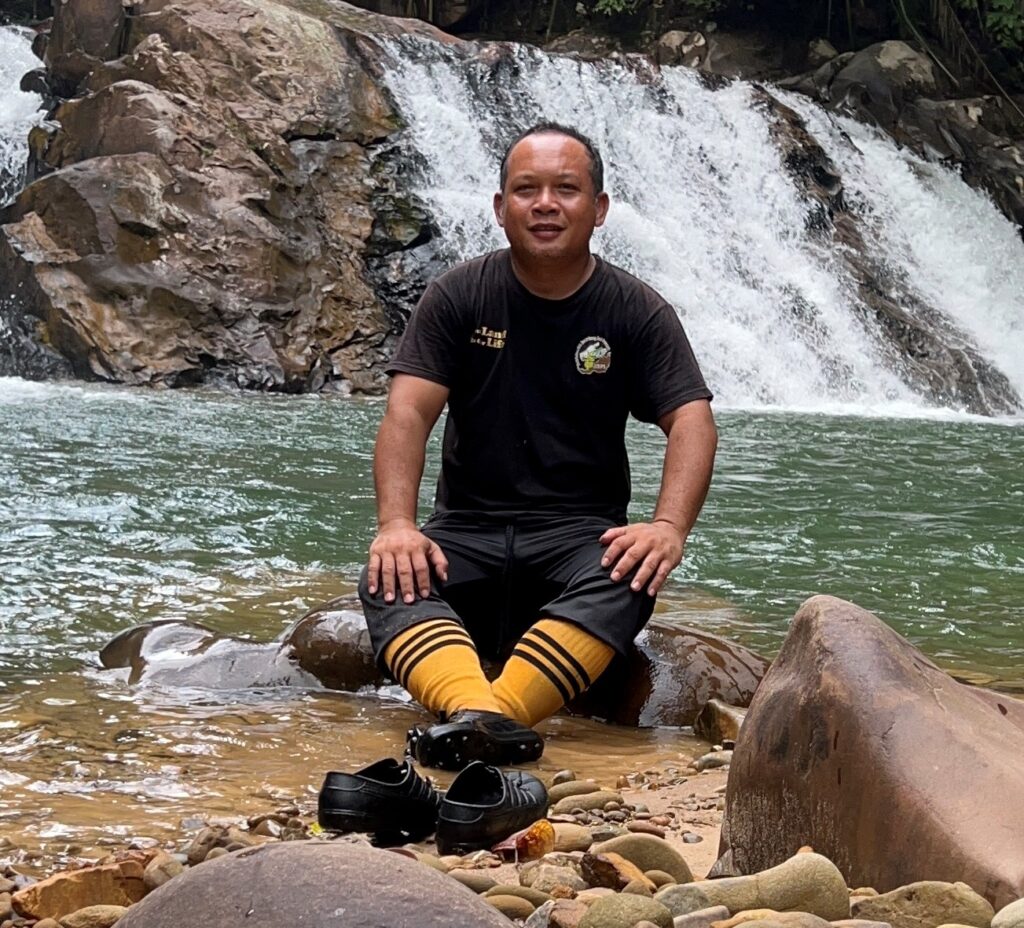
Gebril Atong is an Indigenous human rights rights defender from the Malaysian Punan Ba community in the state of Sarawak, part of East Malaysia and the island of Borneo. Gebril’s human rights advocacy began when Malaysian timber and plantation companies grabbed his ancestorial lands. Gebril’s story of rights advocacy is very personal. It also exemplifies the intersection of human rights and environmental defence – on the frontlines of the climate emergency.
“The timber companies bulldozed my father’s land without any consultation with us. I found out later that the village chief and his purported committee negotiated a deal with the timber companies but did not bother to contact us,” Gebril said. “I was not going to give up my ancestral land so easily.”
Gebril decided to protest. He went to Kuching the capital city of Sarawak, to lodged a complaint to SUHAKAM (Malaysian Human Rights Commission) and met with journalists, and informed them about what was happening in his village. (These events took place in 2006)
Journalists from the local newspapers Borneo Post and Berita Harian took an interest in Gebril’s story. With the proof and evidence in hand, Gebril told the story of how the local timber companies collectively violated Gebril’s and his community’s native customary rights (NCR). Such coverage was a booster for Gebril’s campaign. Apart from that, Gebril and his community also took part in SUHAKAM Indigenous Peoples’ Land Rights National Inquiry in 2011.
Gebril, who calls himself “a village boy”, felt he needed further knowledge, skills and allies to make the campaign for his community more impactful. In 2012, upon the recommendation of his friend Thomas Jalong, Gebril joined DTP’s regional capacity building program on the rights of Indigenous peoples, held in Sabah.
Gebril said the DTP training gave him a chance to boost his confidence, which matters, to advance a campaign against giant companies responsible for destroying the forests of Sarawak.
“When you know people like you are out there who are struggling the same struggle as you, fighting for the same cause as you even though in a different country, this can motivate you. It makes you feel more confident. Meeting other human rights advocates in the DTP training was, therefore, a huge confidence booster for me. The DTP training helped me realize I am in the right position to fight for justice for my community”.
However, confidence was not the only takeaway for Gebril from DTP training. The training offered him an opportunity to sharpen his advocacy skills.
“I learned how to lobby and amplify and expand my network and influence among the people working in this struggle. I believe I am quite good at this now.”
Gebril was also inspired by the life story of the DTP founder José Ramos-Horta:
“In the training, we were told how José Ramos-Horta went to UN, and informed the UN about the Indonesian invasion of East Timor. I was inspired by it. Listening to that I reflected upon my journey from the village to the city and how I informed the media to publish my story so the world knows about the destruction of the rainforests, of our communities. That story brings special significance to the village people like me.”
In 2014, Gebril led his community to lodge a lawsuit against the Sarawak government and seven timber and plantation companies for violating their native customary rights. Gebril’s struggle continues, and he knows the road is long and hard, but he strongly believes DTP’s training equips advocates like him – “a village boy” with the necessary tools “to climb the mountains”.
Latest update – RULING for the case is expected to be delivered by the High Court sometime within this year.
DTP acknowledges the traditional custodians of the land on which we work, the Bedegal people of the Eora Nation. We recognise their lands were never ceded, and we acknowledge their struggles for recognition and rights and pay our respects to the Elders – past, present – and the youth who are working towards a brighter tomorrow. This continent always was and always will be Aboriginal land.
Aboriginal and Torres Strait Islander peoples should be aware that this website contains images or names of people who have passed away.
DTP acknowledges the traditional custodians of the land on which we work, the Bedegal people of the Eora Nation. We recognise their lands were never ceded, and we acknowledge their struggles for recognition and rights and pay our respects to the Elders – past, present – and the youth who are working towards a brighter tomorrow. This continent always was and always will be Aboriginal land.
Aboriginal and Torres Strait Islander peoples should be aware that this website contains images or names of people who have passed away.
Privacy Policy | Terms of Use | Disclaimer | Policies
© 2022 Diplomacy Training Program | ABN 31 003 925 148 | Web Design by Studio Clvr